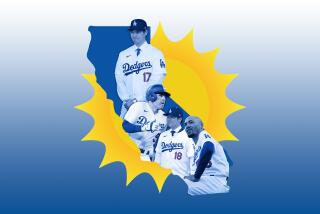Some Firms Make a Case Against Advertising
Rick Rosenfield recently received a pair of costly running shoes from a Los Angeles advertising agency.
The firm was eager to create a campaign for California Pizza Kitchen, which is Rosenfieldâs popular Beverly Hills restaurant chain. When the agencyâs top brass found out that Rosenfield was a marathon runner, they figured he might be swayed by the running shoes. Tucked inside one shoe was this note: âWe hope weâre in the running for your business.â
But the agency ran into a brick wall.
Since Rosenfieldâs restaurant chain was created four years ago, he has heard from dozens of Los Angeles-area advertising agencies. But California Pizza Kitchen simply doesnât advertise. And it has no plans to.
âI donât go to restaurants because I read their advertisements,â said Rosenfield. âSo, why should I think anyone else does?â Rosenfield says word-of-mouth advertising is the best promotion for his business. By not advertising at all, he figures that his company saves about $1 million annually.
Also giving advertising a harder look these days are officials at several other Southern California companies, including Price Club, Wet Seal and Dep Corp. They say advertising can often be a waste of time and money. Many retailers often spend an amount equal to 5% of total sales volume on advertising. But some retailers insist that money is better spent on things such as store construction, improved packaging or just lower product prices.
Of course, few advertising executives will agree with that.
âIf you make something so good that everyone is talking about it, you probably donât need to advertise,â said Jack Roth, president of the Los Angeles ad agency Admarketing. âBut that is a rarity. Maybe one in a thousand can do it.â
âI donât see how you can be competitive if you donât tell people who you are and what you have,â said John OâToole, president of the American Assn. of Advertising Agencies, a New York-based trade group. âBesides, advertising actually decreases the cost of a product. It allows for mass merchandising and mass marketing so that the cost of each unit is reduced.â
Not everyone buys that theory. Dep Corp., which makes personal-care products, last week handed its $8-million advertising business to Chiat/Day in Venice. But there is one line of the Rancho Dominguez-based companyâs products that neither Chiat/Day--nor for that matter, anyone else--will be handling.
That year-old line is called LA Looks. It is a low-cost line of hair-care products--from shampoo to styling spray--directed exclusively at teen-agers. These products all retail for about $1.99 and come in bright, flashy packaging. And Depâs chairman insists that the very success of that line depends, in part, on not advertising it.
âI know it goes against the grain to be successful and not advertise,â said Robert Berglass, chairman of Dep. âBut if I can sell a product to 25 million people without advertising, why do it?â
If he advertised the LA Looks line, Berglass figures the price would shoot up 40%. While advertising might help him get more shelf space, Berglass says the higher prices could cost him millions of customers. In Japan and Europe, however, where the line is also sold, the company does advertise it as a very hip, American product.
âWe have always been skeptical of the impact of advertising,â said Ken Chilvers, president and chief executive of Wet Seal. His Irvine-based chain of young womenâs fashion stores doesnât advertise. It has no ad budget and no ad director.
âWe take the money that others would use for advertising and stick it into the physical construction of the store,â said Chilvers. âThe store becomes our advertisement. And hopefully, it turns the heads of shoppers in the mall, just like a good newspaper ad might catch the eye of a reader.â
Whatâs more, Chilvers says good store locations bring in a lot more customers than do advertisements. âIf you donât have a good location, with lots of foot traffic,â he said, advertising is necessary.
Price Club is one of the biggest Southern California companies that donât advertise.
âAdvertising is expensive,â said Brent Knudsen, vice president of marketing at the San Diego-based membership chain. âWe just canât afford it with our thin profit margins.â
The only time Price Club runs an ad is the day before it opens a new store. âFrom that point on, it is mostly word of mouth that carries us,â said Knudsen, whose company operates 41 stores in eight states. And Price Club seems to have done well for itself without ads. Its 1988 net income of $94.8 million was up 29% from the year before.
âWe think there is a place for advertising,â said Knudsen, âbut generally, we really believe that it just adds an unnecessary expense to the cost of doing business.â
In fact, instead of paying for advertisements, Price Club actually collects money from companies that run advertisements in its own monthly newspaper, Price Club Journal. The paper is mailed at no charge to members. The paper--which features shopping tips by such consumer advocates as Ralph Nader--is loaded with classified advertisements from individual members, as well as quarter-page ads from some small business members.
âWhenever an ad agency calls us and asks about handling Price Clubâs advertising,â said Knudsen, who also is publisher of the Price Club Journal, âwe turn it around and suggest that they get their clients to advertise in our Journal.â
Ray Charlesâ Sees New Way to Help Deaf
âRay Charles is not blind.â
That is the attention-grabbing message flashed on the television screen as Charles sings âI Canât Stop Loving You.â The public service commercial--which is also repeated in billboard and print ads--goes on to explain that âRay sees a way to end deafness.â
The advertisement was created by Kresser, Craig/D. I. K. Advertising in Los Angeles for Ear International, a Los Angeles-based nonprofit organization for the hearing disabled. It seems that the agencyâs creative director, Ron Goodwin, became interested in the problems of the deaf more than 17 years ago after a tumor was removed from his inner ear.
A few years ago, Ray Charles also developed some minor hearing problems that have since improved. Charles found out about Ear International and has since been a major supporter of the organization. In fact, Charles helped underwrite a laboratory to develop electronic implants for the deaf. âRay saw a way to help,â the ad says. âCan you?â
âRejects Awards Showâ Feeling a Bit Rejected
Is the First Annual Rejects Awards Show itself a reject?
The show was supposed to be a showcase for frustrated ad agency artists and writers who created ads that never got used. But the national competition received only 150 entries for its 13 ad categories.
âObviously, the response is not what weâd hoped for,â said Robert Schmierer, whose Oceanside-based ad firm, Heretic Advertising, is sponsoring the competition. âWe were hoping to get at least 500 entries.â
But Schmierer said he still plans to publish a book of all entries--and will sponsor a banquet for the winners. The banquet will be held in Los Angeles sometime in July.
Of course, based on the limited number of entries, Schmierer said, âwe may have to hold it at Melâs Bowling Alley.â
âSports Devastatedâ Wages War on Steroids
With a name like Sports Devastated, some might think the publication is actually a parody of Sports Illustrated.
Far from it, Sports Devastated is a publication printed with one purpose--to keep teen-agers from using steroids.
âAfter the Ben Johnson incident, many kids actually became more interested in steroids,â said Anita L. DeFrantz, president of the Amateur Athletic Foundation, a Los Angeles-based group that published the magazine. DeFrantz is a former Olympic medalist in rowing, and the nonprofit group she heads was formed with leftover funds from the 1984 Summer Games.
The magazine features interviews with Los Angeles Laker center Kareem Abdul-Jabbar and Olympic gold medalist runner Edwin Moses. An estimated 50,000 copies of the glossy publication--designed by the Los Angeles graphic design firm White & Associates--will primarily be distributed this month at high schools and junior high schools.
Why the name Sports Devastated? âWe were trying to find a title that would catch the attention of high school kids.â And how does Sports Illustrated feel about the name? âI havenât even seen it,â said Dallas Marvil, West Coast manager of the magazine. âBut speaking for myself and not Sports Illustrated, it sounds like a good cause.â
More to Read
Inside the business of entertainment
The Wide Shot brings you news, analysis and insights on everything from streaming wars to production â and what it all means for the future.
You may occasionally receive promotional content from the Los Angeles Times.










